Having a good microphone is essential whether you’re recording videos, live streaming, improving sound quality on conference calls, or adding a nice vocal to music. It is the first point of contact in the recording process and perfectly defines your sound.
Some mics are better at recording music, while others are ideal for instruments. This guide helps you find the right microphone with pro tips and guidelines that’ll get the job done.
The best high-end microphone for voice recording is the Shure SM7B. The Shure is a resilient sound horse that has survived thousands of advancements in audio recording. The best voice microphone for $100 or less is the AKG P120. The P120 is a perfect starter mic for podcasts, studios, voiceover, and more.
More details on the best microphones for voice recording (plus a few runners-up) in a minute, but first things first…
What Are The Main Types Of Microphones?
If you’re new to music instruments, we’d love to cover three main types of microphones:
- Dynamic microphones
- Condenser microphones
- Ribbon microphones
Each type has its own unique benefits, and if you’re able to understand its use, you can make your recordings sound better.
Dynamic Microphones
These employ the basic structure of audio capture as they input sound waves, which causes the coil inside to vibrate and induce a current. Dynamic mics are tough and durable but won’t produce crisp sounds like condenser microphones.
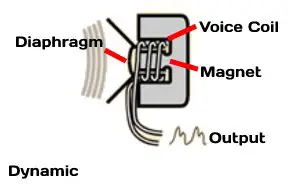
Condenser Microphones
Condenser microphones are sensitive to high and low frequencies, producing a more “colored” sound than most alternatives. They are great for picking up room ambiance and general background noise.
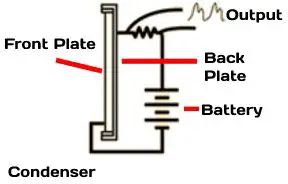
Ribbon Microphones
Popular in the 50s and 60s, ribbon microphones are the most sensitive and pretty expensive! So even for most intermediate producers, ribbon microphones may not be a favorable choice because of the cost.
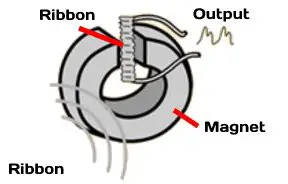
How To Pick The Best Microphone For Voice Recording
The ideal microphone entirely depends on your studio setup. However, while coming up with this list, a few factors came to mind. These factors make it easy to choose a mic that suits you. So, let’s look at the best way to ensure you have an ideal microphone for voice recording.
Your Voice
Well, choosing a microphone according to someone’s recommendation is not bad, but you need to look for a piece that makes you sound good. You’d be surprised at how much listeners get bored immediately when they notice the audio quality isn’t good.
If you’re going to spend $300+ on a microphone, then it must be good at capturing your voice. So, if possible, test out your voice before making a purchase decision. You can do a few DIY methods if you are buying online, such as finding a reviewer with a similar sounding voice.
Your Purpose
Before buying a microphone, envision yourself using it and the type of environment you will be recording. If you want to launch a podcast with many friends talking over one microphone, a condenser mic would be ideal.
If you already have an acoustically treated room, consider the highly-sensitive Shure SM7B. If you live in a condo or apartment or a noisy place, you should consider buying a dynamic mic to remove unnecessary background noise.
Knowing the exact purpose for purchasing your mic will help you weed out plenty of microphone brands and save time from reading endless reviews.
Durability
A microphone should last as long as the music it records.
If you’re going to spend a few hundred dollars on a microphone, ensure it has a solid build with durable materials. Plus, try to see if you’re going to use the microphone on a stand, or you will be moving around with it.
While there’s no practical way to test the durability of a microphone, you can still determine if a microphone will break in a few days or not. The best way is to check genuine online reviews and ensure people are happy with their mic.
Budget
This one is a bit obvious. But your budget will guide you to the road to “value for money.” Spending top dollar for a microphone only to end up in a noisy room is not a wise choice. Remember, you can always upgrade. So there’s no rush in getting the most expensive microphone at the moment.
How To Recognize Low-Quality Microphones
If you have encountered issues with your newly bought microphone, it may be time to do necessary checks and determine if your mic is low quality.
One obvious way is to compare it with a reference microphone. Use a microphone you’re already familiar with to check the frequency range, response, SPL, and other features using digital audio software.
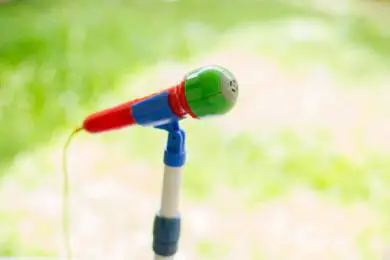
Apart from using a reference mic, you can check the microphone’s build. For instance, cheap plastic construction indicates low quality as the material is not durable.
Features such as shock mounts are essential, and they need to come as an accessory when you buy a microphone. If it doesn’t come with a shock mount, you’re going to have a hard time setting up your recording station.
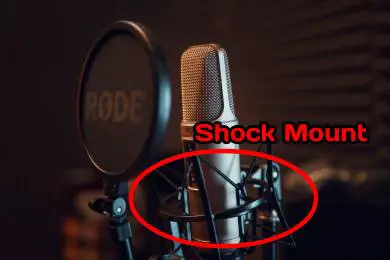
Also, if your microphone is not in the 20Hz to 20kHz range, consider it a cheapie. This is the ideal frequency for a human ear, and anything higher or lower is tricky to capture and typically not needed.
Best Microphones For Voice Recording Reviewed
Before unveiling our top picks, it is worth noting that each model went through rigorous tests to assess its functionality, appeal, and value.
Is There Any Good Microphone Below $100?
Yes.
In fact, we found more than one.
AKG P120
The AKG P120 professional studio microphone was built for a wide range of uses. It has an in-built attenuator and a low-cut filter to remove background noise and prevent overloads. Since it wasn’t made for any specific purpose, we get why it is just under $100.
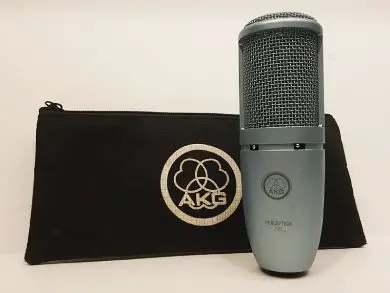
But still, it was surprising to find the AKG P120 had an excellent metal chassis and generally a solid metal body with a suspension shock mount for handling vibrations and noise. Moreover, as an entry-level microphone, the P120 doesn’t cut corners and offers what is essential- sound quality.
It is an all-around microphone that you can use in podcasts, studios, voiceover, and anything you might need recording. Considering its versatility, this microphone was worth noting as a top pick in the budget microphones for vocal recording.
MXL 770
Even though most people associate MXL with cheapies, the MXL might prove to be a contender in the under $100 range. It is an excellent addition if you don’t have a condenser mic in your home studio.
The packaging doesn’t look cheap at all, and it comes in a matte charcoal finishing with gold lettering on the trim. We prefer a lighter tone as the current one doesn’t make the mic look sleek. But still, it doesn’t look cheap, and it performs better compared to higher-priced condenser mics.
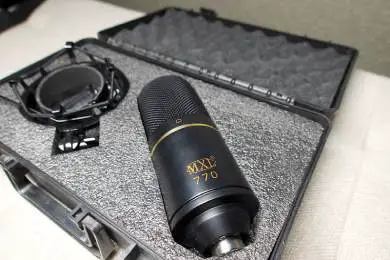
The MXL 770 has a slightly narrow diaphragm of about 0.87 inches, allowing it to produce quality sound for various recording purposes. It effectively produces the common “crisp,” “clear” voice that most people look for in mics.
Audio Technica AT2020
Audio Technica has a wide range of microphones, and the AT2020 is a bit of a bad boy. It comes a little under $100, and the all-black metal look is definitely professional. The microphone is versatile and can handle all kinds of recording environments without too much compression. If durability were the only factor to look at, the AT2020 would emerge victoriously. It has a tough, rugged build made of steel.
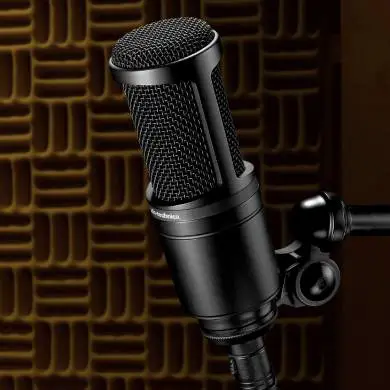
It is a cardioid condenser microphone and provides a comprehensive frequency response between 20Kz and 20kHz. The At2020 produces a bright modern sound with an SPL rating of 144db. SPL means Sound Pressure Level, and it measures how much sound the mic can take without distortion. This rating means the microphone can take in plenty of sounds from cymbals, drums, vocals, etc.
Although the Audio Technica is a great microphone for its price, it still lacks a few features that you would see on high-end microphones. For instance, no roll-off filter limits the mic to acoustic guitars and vocal recordings. It also has self-noise, which can be heard during “dead air” breaks. Still, the AT2020 has a quality build and does well in vocal recording sessions.
Best High-End Microphones for Voice Recording
Shure SM7B
There is a good reason why you’ll find this microphone in almost any recording studio, sound stage, or live venue you step into. The Shure is a resilient sound horse that has survived thousands of advancements in audio recording. It is still an impressive microphone with excellent performance for every voice level.
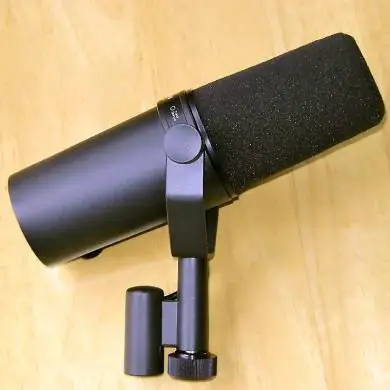
The price of this microphone already cuts off beginners or hobbyists, so it is a serious consideration if you want to do professional audio recording. The mic has been used by world-famous singers and celebrities like:
- Michael Jackson
- Dave Grohl
- Keith Urban
- Plus many more!
So what makes it so precious?
The mic has a large diaphragm with a low-end frequency response and a high SPL to handle all blasting sounds from instruments. Also, the SM7B is a unidirectional dynamic microphone which means it records audio from one source. Therefore, the microphone can be an excellent piece if you have a precise mic placement.
Of course, it doesn’t have a sleek design (this one was designed in 2000), and it’s a bit chunky to maneuver. Luckily, these few hitches don’t remove the quality of the SM7B, which has helped it earn a top spot for the best high-end microphone.
Audio Technica AT4040
Another high-end microphone for vocal recording is the Audio Technica AT4040. It has a black metal build with a silver Audio Technica logo. We wouldn’t recommend hitting it with a hammer, but the solid metal body guarantees durability in most situations.
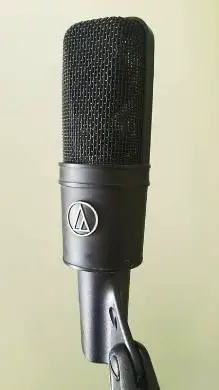
Like most mics in this price range, it offers excellent voice recording, ideal for vocals and podcasts. This model is equipped with transformerless circuitry to help the mic pick up even the sharpest sounds. Plus, the extra thick diaphragm on this microphone reproduces sound vocals without altering the sonic characteristics.
While the ability to capture even the slightest sounds is impressive, you’ll have to soundproof your room to use the AT4040 optimally. Nevertheless, the microphone still does an excellent job blocking distractions and honing out your voice.
Apart from the mic’s performance, it also comes with essential goodies that add value to its price. The At4040 comes with an At8449a shock mount, a ¼” to ⅝” mic stand adapter, and a dust sleeve. This is an excellent investment for producers looking for that “lead” microphone or to step up their game to something that can last up to five years.
Mojave Audio MA-200
Probably one of the most expensive microphones on this list is the Mojave Audio MA-200 large-diaphragm tube condenser microphone. At first, we were stunned by the price (about $1000+), but a few tests proved that the mic is a serious contender in professional audio recording.
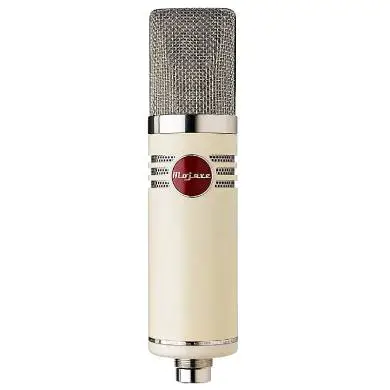
The MA-200 utilizes a military-grade JAN 5840 vacuum tube and hand-selected capsules for its operation. It has a cardioid polar pattern which is excellent for vocal recordings. You can easily sing into the microphone without fear of background noise, as the MA-200 does a pretty good job eliminating noise disruptions.
Unfortunately, the Mojave Audio MA-200 only uses this one pattern, unlike most brands with up to nine pick-up patterns. We would love to see a better version with more patterns so that the microphone can be a bit more versatile. All in all, it has an exquisite look and luxe but somehow fragile appeal. So, you might want to be a little careful when handling it.
Everything else in this microphone is pretty standard with accessories such as power plugs, shock mounts, and all required fitting.
Conclusion
Winding up, we can say that there are indeed a few microphones that do excellent voice recording. Each piece in this list has its perks: build, frequency response, distortion limits, and price.
Although it has a high price tag, the Shure SM7B is an excellent choice for professionals. On the other hand, beginners may consider the AKG P120 for its diverse functionality. That said, we hope you have an insight on how to purchase the best microphone for voice recording.
